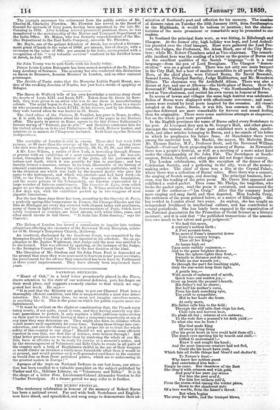NATIONAL DEFENCES.
"Heart of Oak," in a brief letter prominently placed in the Times, draws attention to the state of our national defences, puts his finger on their weak place, and suggests a remedy similar to that which we sug- gested last week. He says— "It is said that the Ministry are going to put our Channel Fleet into a thoroughly efficient condition, and this is unquestionably a most wise deter- mination. But, this being done, we must not imagine ourselves secure, or anything like it. This is the point on which the public require more en- lightenment.
"It must be evident on the slightest consideration that, the French navy being nearly, if not quite espial to ours, and they having scarcely any dis- tant possessions to protect, it only requires a little judicious manceuvring on their part to insure their having at least a temporary superiority at sea at any time they may determine on. They might also form an alliance which would insure such superiority for some time. Taking these things into con- sideration and also the chances of war, is it proper for us to trust the whole safety of this country to our ships ? Should we not provide some efficient resource in case this, our first line of defence, were broken through ? And what better provision can we make than by rendering the whole of our Mi- litia force so effective as to be ready for service at a moment's notice, and by the encouragement of Volunteers and Rifle Clubs to create in all parts of the country such a body of Englishmen skilful in the use of their weapons as would render an invasion a vastly more formidable affair than it would be at present, and would produce such well-grounded confidence in the country as would free us from these periodical panics, which are so unbecoming in the greatest nation in Europe ? "
Apropos of the topic on National Defence in our last issue, our atten- tion has been recalled to a valuable pamphlet on the subject published by Parker and Co., Military Library, on "Volunteers and Rifles." It is in the shape of a letter from Lieutenant-Colonel Alexander Gordon to Sir Charles Trevelyan. At a future period we may refer to it further.


























 Previous page
Previous page